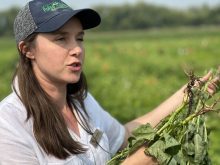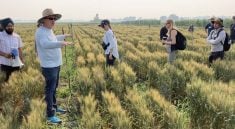A new University of Manitoba research chair is taking the fight against weeds to the next level.
The Manitoba Crop Protection Chair in Weed Management is dedicated to research that will support integrated weed management strategies.
In late September, the university announced the appointment of Dilshan Benaragama to the new role.
Read Also

Farm Credit Canada forecasts higher farm costs for 2026
Canadian farmers should brace for higher costs in 2026, Farm Credit Canada warns, although there’s some bright financial news for cattle

“This is a great opportunity from my perspective,” says Benaragama. “It allows me to start working right away and to interact with producer groups as well as producers and try to develop solutions in terms of weed management in farmers’ fields.”
Why it matters: As resistant weeds become more common, new tools will be needed to fight them.
So far, Benaragama has been focused on writing grant proposals for project funding. His field research is set to begin this spring. Benaragama joined the Department of Plant Science in the Faculty of Agricultural and Food Sciences on May 1 as an assistant professor.
One of his projects involves the use of remote-sensing technology in weed management.
“That’s a big project that I’m working on at the moment,” says Benaragama, although he is waiting for grant approval. “It’s still in the development phase.”
He’s also working on integrated weed management projects.
“Those are the main two areas that I will be focusing on for the next couple of years.”
Benaragama completed his graduate program in weed science at the University of Saskatchewan. He comes to the UM after serving as a senior lecturer in plant science at the University of Rajarata, Sri Lanka, and as a postdoctoral fellow at the U of S.
Funding for the first five years of Benaragama’s employment (salary and research funds) was provided by various agricultural commodity groups and will not come from university coffers.
“At this level, crop associations regularly provide funds to universities for crop research,” says Garth Patterson, executive director for the Western Grains Research Foundation (WGRF), which is funding the position along with Manitoba Crop Alliance, Manitoba Canola Growers Association and Manitoba Pulse & Soybean Growers.
While it is common for research project funds to cover positions for technicians and postdocs, Patterson says it’s less common for commodity groups to fund a specific position.
This is the fourth research chair position that WGRF has funded at a western Canadian university in recent years. It is part of an initiative launched by WGRF after a 2014 study noted that academic retirements would soon put a strain on agronomic research capacity at western Canadian universities.
After consultations with researchers, farmers and other commodity organizations, Patterson says a strategy was established to address the looming crunch.
“Basically, we approached the universities of Manitoba, Saskatchewan and Alberta – the three key agricultural universities with research capacity – and said, ‘let us know what kind of capacity building you need in the area of crop agronomy research, and we will consider proposals.’”
The pitch was well received and, in addition to Benaragama’s recent appointment, three other research chair positions were filled: Linda Gorim, WGRF Chair in Cropping Systems at the University of Alberta; Mario Tenuta, Industrial Research Chair in 4R Nutrient Stewardship at the University of Manitoba; and Maryse Bourgault, WGRF Integrated Agronomy Research Chair at the University of Saskatchewan.
The WGRF has invested $9 million in hiring research chairs, but as is the case with Benaragama’s position, other funders were brought on board to share the burden. Each position has financial support for five years and each university must absorb the cost of maintaining that position afterward.
“It varies a bit with the university but generally, we found by kick starting things with farmers’ dollars, the universities pick it up as a permanent position over time. We just help them get it established,” says Patterson.
While weed science was identified in the 2014 study as an area of concern, Patterson says the WGRF was not prescriptive in what it wanted from the universities. The research chair position was established because the university recognized the need.
“We left it open to them to identify where they could strengthen themselves,” says Patterson. “And once those researchers are appointed, we do not direct their research. They are employees of the university. They’ve got professional freedom to operate just like all of the other researchers.”
Martin Scanlon, dean of the faculty of agriculture at UM, said Benaragama’s research program in integrated weed management will broaden the institution’s capacity to develop crop production and weed management solutions that benefit Manitoba producers.
“This is an important step in achieving our vision of being among the best crop research student training institutions in North America,” Scanlon said in the media release announcing the appointment.
















